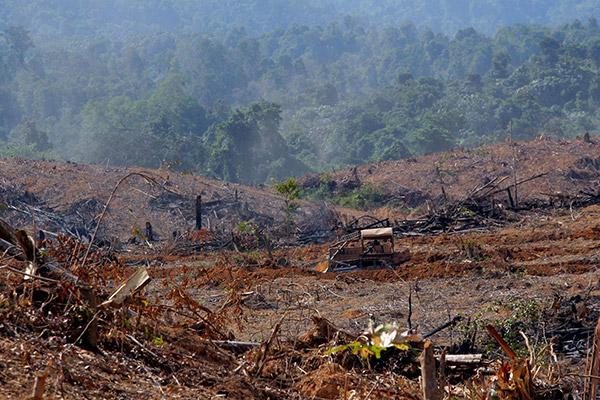 KUALA LUMPUR: You may have heard that the country’s rainforest is fast depleting due to ferocious logging.
KUALA LUMPUR: You may have heard that the country’s rainforest is fast depleting due to ferocious logging.
However, what you probably did not hear is that it is going at a rate so fast that it is rather impossible to state logging figures, because the numbers are rapidly changing by the week.
As Pertubuhan Pelindung Khazanah Alam Malaysia (PEKA) president Datuk Shariffa Sabrina Syed Akil puts it, “It’s all about the money! What you must understand is that logging brings fast money. If you have the licence or the proper letter, you just show it to them and the money is there (sic),” said Shariffa Sabrina during the launching of Save Our Rainforest Race SORR) 2016 here, recently.
She said the crisis was worsening each day, and it seemed like the louder environmentalists like PEKA spoke against it, the more rampant the deforestation.
“We are not anti-logging. But if you could see what I saw, what was once a beautiful forest turn into “padang jarak padang tekukur” (a wasteland), you would feel very sad too.
“The way the trees are cut is also very appalling. They cut young trees, trees near the river and trees that support big chunk of stones,” she lamented, adding that the ignorant manner in which trees were felled compromised the safety features that God had put into place.
Ignored policies
However, Universiti Putra Malaysia’s Senior Lecturer of the Human Ecology Department Dr Abdul Razak Abdul Rahman said the country actually has one of the best forest management policies in the world.
Unfortunately, he said, greedy and shortsighted parties have manipulated the enforcement of these policies, rendering them impotent.
Among the policies is that trees must reach a certain diameter in size or mature age before they could be felled, which means young trees must be left behind so that the area could be harvested again after 30 years.
“The ‘ibu pokok’, which are usually the oldest, biggest trees from different species, should also be spared. We must keep these trees for their seeds or else they would go extinct,” he said.
According to Abdul Razak, it was near impossible to grow back a damaged forest and was certainly not as easy as replanting trees. The complex process involved many intricate factors including species diversity.
“Not every species would grow in a certain place. For example, a Meranti species in Kelantan is very different from Meranti in other states, so if we were to plant this type of Meranti in other places it would not necessarily grow.
“That is why it is very important for us not to cut all the trees during logging or randomly bring in foreign species,” Abdul Razak explained.
He said the authorities needed to better support the country’s forest management for the system to become more effective.
“The cost of managing the forest will definitely escalate in the future if we do not pay attention to details now,” said Abdul Razak, who is also the PEKA Vice president.
When nature strikes back
It is a well-known fact that deforestation causes long-term effects such as global warming and climate changes, which Malaysians, as well as the entire world have already experienced in the past five years.
Many have yet to forget how they suffocated during the two-month haze last year caused by the uncontrolled forest burning and land clearing in a neighbouring country.
Drastic disasters, namely the Cameron Highlands landslide and the major floods in the east coast two years back, had resulted not only in the destruction and loss of property but lives as well.
Shariffa Sabrina also pointed that not only was the forest biodiversity becoming increasingly threatened, the extreme deforestation had also affected the livelihood of the Orang Asli whose survival depended on the forest.
Compared with other Asean countries like Thailand, Laos and Vietnam, Malaysia was actually going backwards in forest conservation and preservation, she said.
“Can we call ourselves a developed nation if we cannot take care of our own natural resources?” she questioned.
Shariffa Sabrina proposed that the government allocate a budget specifically for nature conservation and preservation and ensure that every state maintains at least 50 per cent of their rainforest.
Most important of all, she said, was that Malaysians should shift their apathetic stance and jointly fight for the protection and conservation of the rainforest.
“Many of us can’t be bothered. They adopt the “it’s not a big deal” or “it’s not my job” attitude, or they say that they can’t do much because they are up against those with political leverage.
“But I believe if the people speak in one language, be vocal, and work together, we can fight against this (destruction),” stressed Shariffa Sabrina.
Race to save the rainforest
PEKA celebrated the annual event ‘Save Our Rainforest Race’ or SORR 2016 at Pusat Pelancongan Pendidikan Eco-Edutourism, Hutan Simpan Sungai Menyala Port Dickson, Negeri Sembilan on March 26.
The fourth edition, themed “Trees Are Our Future”, drew over 2,000 participants for a 10km fun and challenging adventure into the forest, with the mission of planting a thousand trees.
More information on PEKA’s efforts can be obtained from its official website http://pekamalaysia.org/ or the PEKA Malaysia Facebook page. — Bernama
